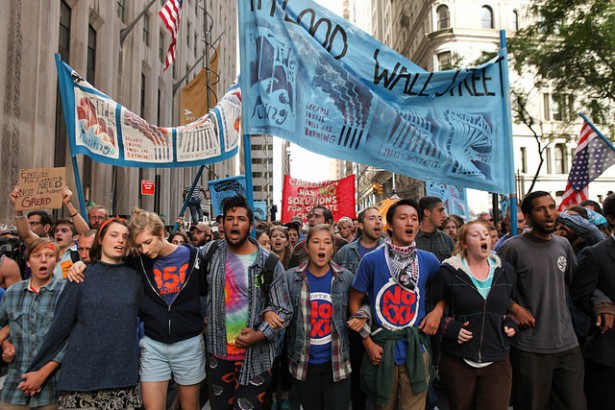
Thousands of protesters took to the streets of Manhattan’s financial district on Monday to highlight the connection between capitalism and climate change. Dubbed Flood Wall Street, the action, organized in part by several Occupy Wall Street veterans, was expected to gather approximately 200-1,000 people. Instead, organizers estimated that at least 3,000 people joined — many of whom were ready to be arrested if necessary.
While the protest began at noon without altercation with police — who initially marched alongside protesters and offered a barricaded route to follow — by nightfall 100 people, including someone dressed as a polar bear, had been arrested. Police also used pepper spray on some protesters.
The action included people from every corner of the country and the world. Before hitting the streets, protesters gathered at Battery Park to listen to speakers from Latin America, Africa and North America, who discussed how climate change has impacted their communities and why capitalism is to blame. Best-selling author Naomi Klein told the crowd that Occupy Wall Street “put corporate capitalism on trial… And now we are back, and we are powered by the knowledge that the same system of short-term profit and de-regulated greed that deepens inequality and forecloses our homes is the very same system that is foreclosing our collective homes.”
Mamadou Goita, from Mali in West Africa, said, “Climate change is already causing damages in the lives of people. It is causing major losses in food production, but still the corporations are making money… Now it’s time to take back our power!” Jorge Santiago, from Chiapas, Mexico, told the crowd, “We have a common responsibility, to prevent destruction and displacement… to confront power imposed on us, to confront the fear that lives in our homes and the fear in ourselves.” American journalist Chris Hedges stated plainly: “This means revolution!”
The people flooding Wall Street were as diverse as those who joined the People’s Climate March on Sunday in New York City, which drew an estimated 400,000 people who marched from 59th Street at Columbus Circle to 34th Street and 11th Avenue (however, some marched from as far back as 86th Street). Climate marchers held signs condemning Israel’s bombing of Gaza, fracking in Chesapeake Bay’s Cove Point, and Canada’s proposed Enbridge Northern Gateway pipeline, which is envisioned to transport oil from Alberta to British Columbia. Dressed as honeybees, Mother Earth, caribous, cranes and rabbits, they called for solar energy, green jobs and better public transport. Despite their divergent interests and backgrounds, they came together to demand urgent action from the world’s heads of state, who are meeting at the United Nations this week to discuss climate change and other issues.
Meanwhile, the protesters who flooded Wall Street were anarchists, socialists, artists, anti-war protesters and First Nations leaders. Nansi Singh, a University of Vermont law student, described this diversity as key to the movement.
“We all come from the same place of unifying together, regardless of if you’re a socialist or an anarchist or whatever your cause,” she explained. “We know the United Nations won’t do it, because we’ve been waiting for 35 years. We demand action.”
Another Vermont law student, Leif, who preferred only to give his first name, was calling for campaign finance reform.
“Wall Street and Big Oil and Big Gas are the ones that pioneered corrupting the political process,” he said. “People are calling for a carbon tax, but that will not happen until we fix political contributions.”
For Frankie, of Boulder, Colo., who also only gave her first name, “Yesterday was a day of celebration, of our collective power, and today is a reflection of the coming resistance.”
Together, they marched to Wall Street, chanting, “De-colonize the water, de-colonize the land, we’re changing up the system, we’re changing up the plan,” and “The people are rising, there’s no more compromising.” They blocked traffic by sitting in front of the iconic Wall Street bull for hours before any arrests were made. One police officer, when asked why law enforcement was allowing the action to continue, simply noted, “this is a special week. The world is here.”
